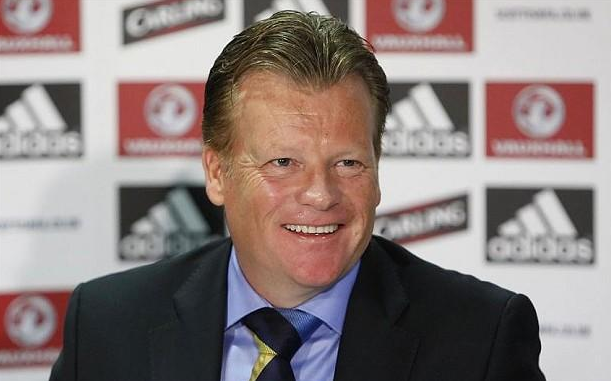Mark Wotte Brings Dutch Creativity to the Scottish FA
Mark Wotte is a well known and highly respected football manager from the Netherlands. Currently the Performance director of the Scottish Football Association, Wotte is the former coach of the Netherlands Under-21 and has managed teams in the Netherlands, Egypt, Qatar, England and Romania.
In 2011, Mark Wotte was named Performance Director at the Scottish FA, bringing nearly four decades of experience to the role. The former Dutch player, who took the pitch for FC Vlaardingen, Feyenoord, FC Den Haag and SVV during his career, looks to help the Scots improve the quality of play through a number of initiatives, including the Performance Information Management System that will monitor all Elite youth players.

Wotte’s coaching career, which began in the mid-1980s, took him through the Dutch ranks, where he managed five Dutch Premier League Clubs, and eventually a chance to work with the Netherlands U21 National Team. In 2006 Wotte left the Netherlands to begin what he calls “some adventurous traveling” as a first team head coach in Qatar, Romania and Egypt before finally landing in Scotland. His two years as U21 National Team coach give him a unique perspective as he works to help further develop the Scottish program.
SoccerToday News Editor-in-Chief Diane Scavuzzo interviewed Mark Wotte on his role at the Scottish FA, the use of technology in youth soccer and the future of soccer in Scotland.
Diane Scavuzzo: What led you to join the Scottish FA in 2011?
Mark Wotte: I felt I had a lot to offer the Scottish FA with my over 20 years of experience both in youth football and First Team management. My 2 years at the Dutch FA as U21-U19 National Team coach was very helpful for implementing a number of Programs in Scotland over the last two and a half years.
When I was with the National Team we had a unique generation of players, and I was involved in producing a strategy document called the “Master Plan for Youth Football.” One of the programs we are implementing in the Scottish FA is the Performance Information Management System.
Diane Scavuzzo: What is the Performance Information Management System, and how does it work?
Mark Wotte: The Performance Information Management System, or PIMS, is our day-to-day monitoring and communication tool and data base. It is our communication tool.
We want to capture as much relevant information as possible in order to track every boy’s and girl’s development over the four-year period. We hope to see what can make the difference in elite youth player development. It is a very secure platform, and players, coaches, clubs and parents can only access the information we want them to see.
Have you ever wondered why the best U11 player not always the best U17 player? By tracking all these key performance indicators (KPIs) and other valuable information, we hope that we can come closer to predictability in elite youth development.
Diane Scavuzzo: What sort of information do you collect on the PIMS?
Mark Wotte: For the seven Regional Performance Schools, we ask the kids to go online in the morning and do a short questionnaire.
They can access the site through any devise – smartphone, iPad, PDA or laptop. We ask them to tell us how they feel in general, what time they went to bed and how many hours of sleep they got and the quality of sleep they had. We also ask about their physical state – if they have any stiffness from the previous day’s sessions, for example – and what they had for breakfast.
Every morning the coaches review this information before the kids arrive at 8:30 a.m. Because we train our players every morning at the school, we need to know what they did at their club in the afternoon or evening the day before. We have a responsibility to be aware of everything that happens with them.
Finally, we monitor all training content that the curriculum provides in certain areas that we feel are key to accelerating player development. All of the schools practice the same themes and content through the curriculum. We also use this with our National Youth Team players.
Diane Scavuzzo: What is your philosophy of coaching soccer?
Mark Wotte: My philosophy in coaching youth soccer is quite simple: the individual development of the young player is essential and should always comes first in youth development.
Diane Scavuzzo: Could you explain that for us?
Mark Wotte: I can explain it in three statements: Play the game. Train the game. Enjoy the game.
Soccer is a game and it should be played. For me, “to play” means giving kids freedom of expression – the freedom to act, the freedom to make decisions and the freedom to explore.
Train the game means to always practice in a way that kids can see the relevance to soccer. They should always work with all of the key elements of the game involved. This means they should always have a ball and be working with both teammates and opponents so there is resistance involved. We must always enforce the rules, such as offsides, and we need to use time to help our kids become quicker and more composed. We need to make use of space to help them learn, both smaller and bigger areas, and of course they need to score and defend against goals.
I always ask the kids three questions, and if they can answer “yes” to all three, it has been a good session. Did you play soccer? Did you learn soccer? Did you enjoy it?
I believe we need to train the brain and not only drill for skill. We should explain what we want the kids to do, and then let them discover how and when to use the various drills to better develop the qualities they have as players. By doing this we will constantly raise their awareness and create more intelligent players – players who are tactically strong and who make the right decisions on the pitch.
Diane Scavuzzo: How would you describe your preferred style of play?
Mark Wotte: I am a great believer in the 1-4-3-3 system of play in all its variations, including 1-4-2-3-1 and 1-4-1-4-1. I occasionally like to manage the game as a 1-4-3-1-2 system, which is the 1-4-4-2 with a diamond midfield.
I am Dutch, so I was born and raised to create instead of react, taking initiative as much as possible. I believe in building from the back with a dynamic midfield, using attacking fullbacks and wingers flying in to support an all-around striker to score goals. I teach teams to put pressure on as soon as possible after losing the ball to retain possession as close to the opponent’s goal as possible.
I believe we have to analyze the game in four moments. First we have to analyze the attack and how we create opportunities for goals. Next we have to understand the transition to defense if we lose the ball. Then we analyze the defense and understand how to disturb the opponent so we don’t concede a goal. Finally we transition back to the attack after winning the ball – either to counter-attack immediately or to keep possession while we build to a new attack.

Diane Scavuzzo: What playing formats do you prefer for youth teams?
Mark Wotte: For players under age 9, I prefer a 7v7 using half the pitch. Once they reach age 9 I move to a 9v9 format on the full pitch. From age 11 up I want to see them playing 11v11.
Diane Scavuzzo: You have worked with all ages as a coach. What do you see as the main differences between working with U12 and U21 players?
Mark Wotte: It’s all about the different stages. U12 is really the time to build foundations, in the sense of technique and awareness, for players to be excellent at U21. Age 12 is a great age to teach players anything. It really is about technique and awareness at that stage. You want to focus on development at U12.
At U21 the players have to be ready to compete for the first team. By that time they should be ready to deliver the different elements required: speed of handling the ball, ability to read the game and make quick decisions, and the mind set to be part of a winning team. Players also have to be able to meet the physical demands of 1v1 play and have the psychological stability to deal with the pressure of a results-oriented first team.
Diane Scavuzzo: And please let us know about the new National Performance Centre that thee Scottish FA is launching…
Mark Wotte: The National Performance Centre of Scotland will open in 2016 in Edinburgh and will be our “Home of Soccer” where all team activities and majority of coach education will take place. It will become a High Performance Centre with top facilities and services for elite player development and performance and will also be open for other sports, athletes and conventions.






